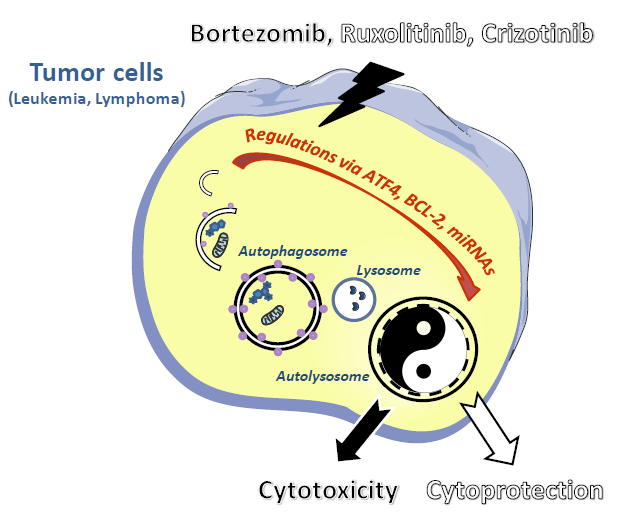Cell cycle, autophagy, and cancer
Centre de Recherches en Cancérologie de Toulouse (CRCT)UMR1037 INSERM / Université Toulouse III Paul Sabatier / ERL5294 CNRS
2 avenue Hubert Curien
CS53717
31037 Toulouse Cedex 1- FRANCE - Toulouse
Site web - stephane.manenti@inserm.fr - 0582741635
Principal investigator
Stéphane Manenti

Research themes
Our group, within the team directed by Dr S. Manenti at the Cancer Research Center of Toulouse, focus on autophagy in three different hematopoietic cancers: Acute Myeloid Leukeamia (AML) [2,3], Myeloproliferative Neoplasia (MPN) and ALK positive Anaplastic Large Cell Lymphoma (ALK+ ALCL) [4–6]. We are interested in several biological questions (listed below), that we address both in cell lines and in primary cells isolated from patients:
-How autophagy influences tumor cells fate (cytoprotection or cytotoxicity) under therapy? In a previous study, we demonstrated that the Bortezomib (proteasome inhibitor) induces a cytotoxic autophagy in AML cells expressing the FLT3-ITD tyrosine kinase oncogene [2]. Conversely, we observed in ALK+ ALCL cells that their treatment with Crizotinib (ALK tyrosine kinase inhibitor) induces a cytoprotective autophagy [4]. A current study, performed in myeloproliferative neoplasia (MPN) harboring the JAK2 (V617F) activating mutation, indicates that Ruxolitinib treatment (JAK1/JAK2 inhibitor) triggers also a cytoprotective autophagy. In these two last studies, combining tyrosine kinase targeted inhibition and autophagy inhibition may represent a promising therapeutic option.
-The identification of new autophagy regulators (proteins and RNAs). We recently found that the transcription factor ATF4 was required for autophagy activation in FLT3-ITD positive AML cells [3]. In Crizotinib-treated ALK+ ALCL cells, we found that the depletion of BCL-2 increases autophagy and promotes tumor cell death [6]. We are currently pursuing these works by focusing on the molecular regulations of these proteins, through translation factors and miRNAs.
-The role of autophagy in cell signaling regulation, in line with the original concept depicting the autophagosomes as new intracellular signaling platforms.
-The potential use of autophagosomes in the development of anti-cancer vaccine. We are currently investigating whether ALK+ ALCL-derived autophagosomes could be used as antigen carrier to stimulate an anti-ALK immune response.
Thus, our work aims to understand the role, the regulation, the modulation and the therapeutic use of autophagy to improve the treatment of FLT3-ITD AML, JAK2 (V617F) MPN and ALK+ ALCL. We receive funds from « La Ligue Nationale contre le Cancer », « La Fondation ARC », « Cancéropole GSO » and from the Europe Union (Horizon 2020, Marie Sklodowska-Curie Research and Innovative Programme); and we train students registered at the Toulouse Biology/Health doctoral school.
Descriptive figure

Publications
1. Joffre, C.; Djavaheri-Mergny, M.; Pattingre, S.; Giuriato, S. L’autophagie: le yin et le yang des cancers. Medecine/Sciences 2017, 33, 328–334, doi:10.1051/medsci/20173303021.
2. Larrue, C.; Saland, E.; Boutzen, H.; Vergez, F.; David, M.; Joffre, C.; Hospital, M. A.; Tamburini, J.; Delabesse, E.; Manenti, S.; Sarry, J. E.; Recher, C. Proteasome inhibitors induce FLT3-ITD degradation through autophagy in AML cells. Blood 2016, 127, 882–892, doi:10.1182/blood-2015-05-646497.
3. Heydt, Q.; Larrue, C.; Saland, E.; Bertoli, S.; Sarry, J.-E.; Besson, A.; Manenti, S.; Joffre, C.; Mansat-De Mas, V. Oncogenic FLT3-ITD supports autophagy via ATF4 in acute myeloid leukemia. Oncogene 2017, doi:10.1038/onc.2017.376.
4. Mitou, G.; Frentzel, J.; Desquesnes, A.; Le Gonidec, S.; AlSaati, T.; Beau, I.; Lamant, L.; Meggetto, F.; Espinos, E.; Codogno, P.; Brousset, P.; Giuriato, S. Targeting autophagy enhances the anti-tumoral action of crizotinib in ALK-positive anaplastic large cell lymphoma. Oncotarget 2015, 6, 30149–30164, doi:10.18632/oncotarget.4999.
5. Frentzel, J.; Sorrentino, D.; Giuriato, S. Targeting autophagy in ALK-associated cancers. Cancers (Basel). 2017, 9 (12),161-180.
6. Torossian, A.; Frentzel, J.; Daugrois, C.; Broin, N.; Gandarillas, S.; Al Saati, T.; Lamant, L.; Brousset, P.; Giuriato, S.; Espinos, E. Blockade of crizotinib-induced BCL-2 elevation in ALK-positive ALCL triggers autophagy associated with cell death. Haematologica, in revision.
Composition de l'équipe
Charly Courdy, Etudiant M2R, charly.courdy@inserm.fr
Véronique De Mas, MCU-PH, DeMas.Veronique@iuct-oncopole.fr
Sylvie Giuriato, CR, INSERM, sylvie.giuriato@inserm.fr
Carine Joffre, CR, INSERM, carine.joffre@inserm.fr
Stéphane Manenti, DR2, CNRS, stephane.manenti@inserm.fr
Domenico Sorrentino, Etudiant en thèse, domenico.sorrentino@inserm.fr